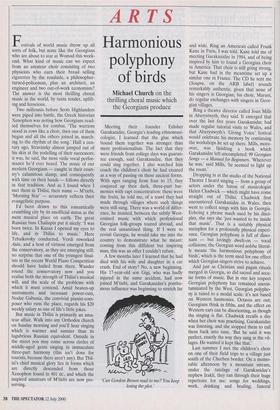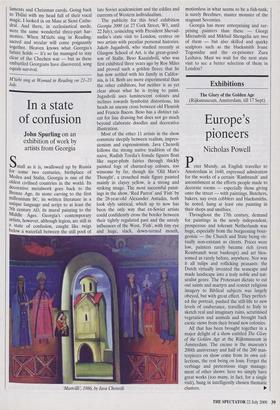ARTS
Harmonious polyphony of birds
Michael Church on the thrilling choral music which the Georgians produce Festivals of world music throw up all sorts of folk, but none like the Georgians who are about to star at Womad this week- end. What kind of music can we expect from an amateur choir consisting of two physicists who earn their bread selling cigarettes by the roadside, a philosopher- turned-policeman, plus an architect, an engineer and two out-of-work economists? The answer is the most thrilling choral music in the world, by turns tender, uplift- ing and ferocious.
Two millennia before Scots Highlanders were piped into battle, the Greek historian Xenophon was noting how Georgians read- ied themselves for combat. 'The warriors stood in rows like a choir, then one of them began and all the others joined in, march- ing to the rhythm of the song.' Half a cen- tury ago, Stravinsky almost jumped out of his skin at the yodelling of their successors: it was, he said, the most virile vocal perfor- mance he'd ever heard. The music of our modern Georgians — caught in their coun- try's calamitous slump, and consequently with time on their hands — follows directly in that tradition. And as I found when I met them in Tbilisi, their name — M'tiebi, `Morning Star' — accurately reflects their evangelistic purpose.
I'd been drawn to this romantically crumbling city by its unofficial status as the most musical place on earth. The great Russian bass Chaliapin put it nicely: 'I was born twice. In Kazan I opened my eyes to life, and in Tbilisi to music.' Here Tchaikovsky conducted, Verdi reworked Aida, and a host of virtuosi emerged from the conservatory, as they are emerging still: no surprise that one of the youngest final- ists in the recent World Piano Competition should have hailed from there. Wander round the conservatory now and you realise both the strength of Tbilisi's musical will, and the scale of the problems with which it must contend. Amid beaten-up instruments and incessant power-cuts, Nodar Gabunia, the convivial pianist-com- poser who runs the place, regards his $20 weekly salary as one of life's little jokes.
But music in Tbilisi is primarily an ama- teur affair. Walk into any Orthodox church on Sunday morning and you'll hear singing which is warmer and sunnier than its lugubrious Russian equivalent. Outside in the street you may come across circles of middle-aged gents singing in immaculate three-part harmony (this isn't done for tourists, because there aren't any). But Tbil- isi's chief musical glory lies in forms which are directly descended from those Xenophon found in 401 BC, and which the inspired amateurs of M'tiebi are now pre- serving. Meeting their founder Edisher Garakanidze, Georgia's leading ethnomusi- cologist, I learned that the glue which bound them together was stronger than mere professionalism. The fact that they were friends from college days was guaran- tee enough, said Garakanidze, that they could sing together. I also watched him coach the children's choir he had created as a way of passing on these ancient forms. With ages ranging from four to 15, they conjured up their dark, three-part har- monies with rapt concentration: these were the fruits, he told me, of a trawl they had made through villages where such things were still sung. There was a world of differ- ence, he insisted, between the subtly West- ernised music with which professional Georgian folk-groups toured abroad, and the real unsanitised thing. If I were to revisit Georgia, he would take me into the country to demonstrate what he meant: coming from this diffident but inspiring man, this was an offer I couldn't refuse.
A few months later I learned that he had died with his wife and daughter in a car crash. End of story? No, a new beginning. His 17-year-old son Gigi, who was badly injured in the same accident, had now joined M'tiebi, and Garakanidze's posthu- mous influence was beginning to stretch far `Can Gordon Brown read to me? You keep losing the plot.' and wide. Ring an American called Frank Kane in Paris, I was told. Kane told me of meeting Garakanidze in 1984, and of being inspired by him to found a Georgian choir in America. That choir is still going strong, but Kane had in the meantime set up a similar one in France. The CD he sent me (Soupra, on the ARB label) sounds remarkably authentic, given that none of his singers is Georgian; his choir, Marani, do regular exchanges with singers in Geor- gian villages.
Ring a theatre director called Joan Mills in Aberystwyth, they said. It emerged that over the last five years Garakanidze had made regular tutorial visits to Wales, and that Aberystwyth's 'Giving Voice' festival would celebrate his memory by continuing the workshops he set up there. Mills, more- over, was finishing a book which Garakanidze left uncompleted: 99 Georgian Songs — a Manual for Beginners. 'Wherever he was,' said Mills, 'he seemed to light up the room.'
Dropping in at the studio of the National Theatre I heard singing — from a group of actors under the baton of musicologist Helen Chadwick — which might have come straight out of Tbilisi. Chadwick first encountered Garakanidze in Wales, then went to collect songs with him in Georgia. Echoing a phrase much used by his disci- ples, she says she 'just wanted to be inside that music'. That is a suitably physical metaphor for a profoundly physical experi- ence. Georgian polyphony is full of disso- nant — but lovingly dwelt-on — vocal collisions; the Georgian word aeleba literal- ly means 'the harmonious polyphony of birds', which is the term used for one effect which Georgian singers strive to achieve.
And just as Christian and pagan rituals merged in Georgia, so did sacred and secu- lar forms of music. But in one key respect Georgian polyphony has remained uncon- taminated by the West. Georgian polypho- ny is tuned to a modal scale: it's not based on Western harmonies. Octaves are out; Georgians think in fifths, and the effect on Western ears can be disorienting, as though the singing is flat. Chadwick recalls a day when her choir was practising, Garakanidze was listening, and she stopped them to call them back into tune. 'But he said it was perfect, exactly the way they sang in the vil- lages. He wanted it kept like that.'
12st summer I met the children's choir on one of their field trips to a village just south of the Chechen border. On a memo- rable afternoon by a mountain stream, under the tutelage of Garakanidze's nephew Irakli, they ran through their huge repertoire for me: songs for weddings, work, drinking and healing; funeral laments and Christmas carols. Going back to Tbilisi with my head full of their vocal magic, I looked in on Mass at Sioni Cathe- dral. And there, in ecclesiastical mode, were the same wonderful three-part har- monies. When M'tiebi sing in Reading, sacred and secular will come poignantly together. Heaven knows what Georgia's future holds — it's so far managed to stay clear of the Chechen war — but as these embattled Georgians have discovered, song equals survival.



























































 Previous page
Previous page